Photo left: Core ensemble and Artistic Director Logan Verdoorn discuss the text and themes of Twelfth Night for their Fall 2017 production.(Photo by Maria Signorelli)
By JAN WILLMS
Nearly 14 years ago, a couple of moms were looking for a program in which their teenagers could work on Shakespearean plays. They looked around and could find nothing available. So they started off as an informal group, working out of an attic.
Today the Shakespearean Youth Theater (SYT) has a studio to rehearse in, as well as provide workshops, at 550 Vandalia. These rehearsals lead to one major Shakespearean production each year, presented in theaters around the Twin Cities.
This year’s offering will be the comedic tale “Twelfth Night,” and it will take place in March at the TEK BOX Theater in the Cowles Center in Minneapolis.
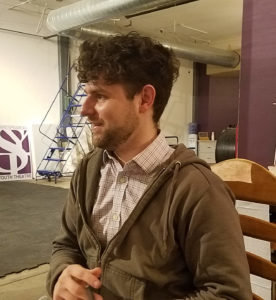 “This program started as a very low-budget small idea, and it has developed year after year,” said Logan Verdoorn (photo right by Jan Willms), who joined SYT as its artistic director a couple of years ago. The organization moved into its present quarters this past summer.
“This program started as a very low-budget small idea, and it has developed year after year,” said Logan Verdoorn (photo right by Jan Willms), who joined SYT as its artistic director a couple of years ago. The organization moved into its present quarters this past summer.
“We’re getting phenomenal artists from Twin Cities theater involved and interested in the group,” Verdoorn said. “We have stuck to the basic principle of doing full-scale productions of high-quality Shakespeare shows and workshops with professional artists; that’s where we still stand today.”
SYT, which has formalized as a nonprofit, has performed at a variety of theaters. “One of our directors, Craig Johnson, had a connection with the James J. Hill House, and we performed “King Lear” there. It was a historic place and a brilliant environment,” Verdoorn said. “We have also performed at Stepping Stone, and we did ‘Romeo and Juliet’ at Phoenix Theater in Uptown.”
Verdoorn said SYT generally works with alternative high schools and has quite a large homeschool base as well. “The theatre began in the homeschool community and expanded from there.”
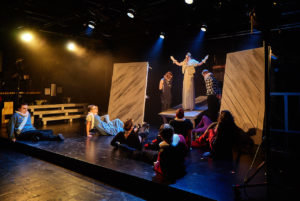 Photo right: The prince interrupts a street fight between the Montagues and Capulets in the 2017 production of Romeo and Juliet. (Photo by Logan Verdoorn)
Photo right: The prince interrupts a street fight between the Montagues and Capulets in the 2017 production of Romeo and Juliet. (Photo by Logan Verdoorn)
He said the primary age group served ranges from 12 to 20, although the organization is exploring working with younger children 9 to 12. SYT has rotating professionals who direct and give workshops, with a year-round program. “We basically have two areas to our program,” he noted. “We have the Core Ensemble, a group of 15-18 youths who are in the year-round program. And we have different workshops offered during the year.”
The program starts in the fall with participants studying the play they will later perform, looking at the themes of the play and how it affects them, according to Verdoorn. Then there are six to seven weeks of intense rehearsal before the production, which is usually presented in February or March.
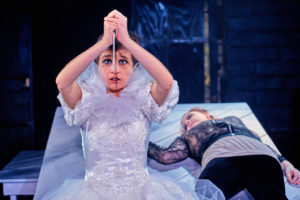 Photo left: Ellie Haugen (left) and Elisabette Hinze-Francis from the March 2017 production of Romeo and Juliet. (Photo by Logan Verdoorn)
Photo left: Ellie Haugen (left) and Elisabette Hinze-Francis from the March 2017 production of Romeo and Juliet. (Photo by Logan Verdoorn)
As part of the group’s development, this year marked its first foray into summer camps. These are intensive day camps offered at the studio space. “In the future, we might look at outdoor camps,” Verdoorn said. “That would really be fun.” He said that since people have more time and availability in the summer, there might also be a possibility of adding smaller productions in a park setting.
“To me, Shakespeare is really interesting,” he continued, “but people are sort of scared of him. They don’t know what he is talking about and think of it as something like a foreign language. What I find is true of professional actors and very true of teenagers is that when they dive in, they understand. I have heard from audience members that they have never really understood Shakespeare until they saw this version.”
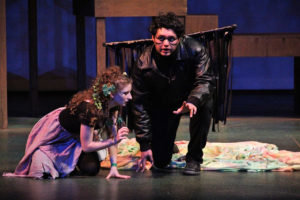 Photo left: Amalia Hertel and Anthony Cadiz perform in the 2012 Production of Midsummer Night’s Dream. (Photo by Robyn Lingen)
Photo left: Amalia Hertel and Anthony Cadiz perform in the 2012 Production of Midsummer Night’s Dream. (Photo by Robyn Lingen)
“I’m blown away at the teenagers’ willingness to just dive in. I think teens are brilliant at Shakespeare. They just accept the given circumstances and common themes he is dealing with that reflect today’s society and reflect what they are experiencing in their lives. That’s what motivates me and makes me love this work, because of how I think teenagers respond.”
Verdoorn said that Shakespeare is considered a classic because each generation who works on his plays find that he reflects what is going on in their current culture, and how that informs the way that they are experiencing growing up. He said Shakespeare passed on stories of what was happening in his time, very basic human experiences that are also important today.
“My favorite thing to do is work with young people,” Verdoorn said. “We have conversations in this room (the studio at Vandalia) where they are delving into certain characters and talking about the theme of the play. They see things that I don’t see. Their perspective growing up as teenagers at this time gives them an exciting view of the classics.”
SYT this past year started a workshop series about some of the technical aspects of theater, working with what it is to design a sound system and build a stage. “They’re learning hands-on skills that are good to have for a young person going out into the world,” Verdoorn said.
Verdoorn said some of the program’s interns often return and help assist with directing a production. “Our community is tight-knit but very dedicated,” he commented. Verdoorn himself is an alumnus of the early years of SYT. He was born in Germany, moved around for a while and ended up spending his teenage years in the Twin Cities. He studied acting at the Tish School of the Arts in New York, then lived in Berlin for a number of years.
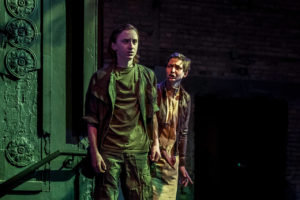 Photo right: Isaac Jaro and Vee Signorelli in the 2016 production of The Tragedy of Macbeth. (Photo by Logan Verdoorn)
Photo right: Isaac Jaro and Vee Signorelli in the 2016 production of The Tragedy of Macbeth. (Photo by Logan Verdoorn)
“I worked for the NYC campus in Berlin,” he said. “When I moved back here, I threw myself into this program. What makes this program stand out and why I came back is how exciting and important it is for us as a culture to believe in the validity of the artistic perspective of these young people. We take seriously their artistic output and what is important to them in these classic stories.”
SYT recently received two grants from the Arts board and Metro Regional Arts Council. “One is for ‘Twelfth Night,’ and the other is for bringing in local high schools to see a show, with a workshop beforehand and a talk-back after the performance,” Verdoorn said. “The best way to teach Shakespeare is to get young people engaged, see how his words are brought to life and see their peers up there performing.”
Comments
No comments on this item Please log in to comment by clicking here